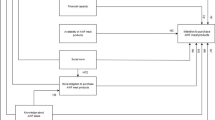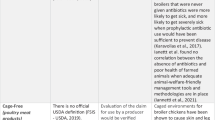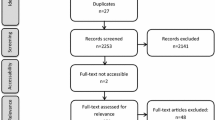Abstract
Food labels serve important informational and signaling purposes however, the subjective beliefs (halos) associated with ethical labels such as farm animal welfare (FAW) labels and their influence on anti-consumption behavior are not well-understood. This paper aims to address how subjective beliefs (halos) about FAW labels affect the milk anti-consumption behavior for different segments of consumers. Data (N ~ 1351) from an in-person opt-in survey conducted in the US were used to address the objectives of this study. Information on respondents’ sociodemographic profile, milk choice and perceptions about FAW was collected. Data were analyzed using multivariate regressions. The results show that FAW labels served as heuristic cues for higher environmental quality and health. The presence of labels also evoked a positive feeling (utility) in consumers. The FAW halos impacted milk anti-consumption. The effects however depended on preference type—milk versus plant-based alternative milk beverages. The results highlight the possibility of appealing to the relevant FAW subjective beliefs by stakeholders interested in fostering anti-consumption behavior as a means to achieving more sustainable consumption behavior.



Similar content being viewed by others
Notes
The “feel good” factor may be considered as a form of direct utility for respondents who buy FAW labelled products/indirect utility for respondents who believe that labels prevent the mistreatment of animals even if they do not consume specific products.
References
Alders, R. G., Campbell, A., Costa, R., Guèye, E. F., Ahasanul Hoque, M., Perezgrovas-Garza, R., ..., and Wingett, K. 2021. Livestock across the world: Diverse animal species with complex roles in human societies and ecosystem services. Animal Frontiers 11(5):20-29. https://doi.org/10.1093/af/vfab047.
Allen, S., E. Goddard, and A. Farmer. 2018. How knowledge, attitudes, and beliefs impact dairy anti-consumption. British Food Journal 120 (10): 2304–2316. https://doi.org/10.1108/BFJ-12-2017-0733.
Alonso, M.E., J.R. González-Montaña, and J.M. Lomillos. 2020. Consumers’ concerns and perceptions of farm animal welfare. Animals 10 (3): 385. https://doi.org/10.3390/ani10030385.
Armstrong, B., A. Meskin, and P. Blundell-Birtill. 2019. Delicious but immoral? Ethical information influences consumer expectations and experience of food. Frontiers in psychology 843. https://doi.org/10.3389/fpsyg.2019.00843.
Anderson, E.C., and L.F. Barrett. 2016. Affective beliefs influence the experience of eating meat. PLoS ONE 11: e0160424. https://doi.org/10.1371/journal.pone.0160424.
Apaolaza, V., P. Hartmann, C. D’Souza, and C.M. López. 2018. Eat organic–feel good? The relationship between organic food consumption, health concern and subjective wellbeing. Food Quality and Preference 63: 51–62. https://doi.org/10.1016/j.foodqual.2017.07.011.
Arvola, A., M. Vassallo, M. Dean, P. Lampila, A. Saba, L. Lähteenmäki, and R. Shepherd. 2008. Predicting intentions to purchase organic food: The role of affective and moral attitudes in the theory of planned behaviour. Appetite 50 (2–3): 443–454. https://doi.org/10.1016/j.appet.2007.09.010.
Barbano, D.M. 2017. A 100-year review: The production of fluid market milk. Journal of Dairy Science 100 (12): 9894–9902. https://doi.org/10.3168/jds.2017-13561.
Boaitey, A., and K. Minegishi. 2020. Determinants of household choice of dairy and plant-based milk alternatives: Evidence from a field survey. Journal of Food Products Marketing 9: 639–653. https://doi.org/10.1080/10454446.2020.1857318.
Bratanova, B., C.M. Vauclair, N. Kervyn, S. Schumann, R. Wood, and O. Klein. 2015. Savouring morality. Moral satisfaction renders food of ethical origin subjectively tastier. Appetite 91: 137–149. https://doi.org/10.1016/j.appet.2015.04.006.
Broom, D.M. 2006. The evolution of morality. Applied Animal Behaviour Science 100 (1–2): 20–28. https://doi.org/10.1016/j.applanim.2006.04.008.
Broom, D.M. 2016. Sentience and animal welfare: New thoughts and controversies. Animal Sentience 1 (5): 11. https://doi.org/10.51291/2377-7478.1024.
Clay, N., A.E. Sexton, T. Garnett, and J. Lorimer. 2020. Palatable disruption: The politics of plant milk. Agriculture and Human Values 37: 945–962.
Cornish, A., D. Raubenheimer, and P. McGreevy. 2016. What we know about the public’s level of concern for farm animal welfare in food production in developed countries. Animals 611: 74.
Costanigro, M., and J.L. Lusk. 2014. The signaling effect of mandatory labels on genetically engineered food. Food Policy 49: 259–267. https://doi.org/10.1016/j.foodpol.2014.08.005.
Costanigro, Marco, and Yuko Onozaka. 2020. A belief-preference model of choice for experience and credence goods. Journal of Agricultural Economics 71 (1): 70–95. https://doi.org/10.1111/1477-9552.12334.
Dagevos, H., and J. Voordouw. 2013. Sustainability and meat consumption: Is reduction realistic? Sustainability: Science Practice and Policy 9 (2): 60–69. https://doi.org/10.1080/15487733.2013.11908115.
Dawkins, M.S. 2017. Animal welfare and efficient farming: Is conflict inevitable? Animal Production Science 572: 201–208.
Duncan, I.J. 2016. Is sentience only a nonessential component of animal welfare? Animal Sentience 1 (5): 6. https://doi.org/10.51291/2377-7478.1024.
Enax, L., V. Krapp, A. Piehl, and B. Weber. 2015. Effects of social sustainability signaling on neural valuation signals and taste-experience of food products. Frontiers in Behavioral Neuroscience 9: 247. https://doi.org/10.3389/fnbeh.2015.00247.
Etzioni, A. 1999. Voluntary simplicity: Characterization, select psychological implications, and societal consequences. Essays in Socio-Economic. Berlin: Springer.
GFI. (2019). Plant-based milk market is worth $1.86 billion. https://vegconomist.com/studies-and-numbers/gfi-plant-based-milk-market-is-worth-1-86-billion/. Accessed 23 Dec 2020.
Górska-Warsewicz, H., K. Rejman, W. Laskowski, and M. Czeczotko. 2019. Milk and dairy products and their nutritional contribution to the average polish diet. Nutrients 11 (8): 1771–1790. https://doi.org/10.3390/nu11081771.
Grethe, H. 2017. The economics of farm animal welfare. Annual Review of Resource Economics 9: 75–94.
Harper, G., and Henson, S. 2001.Consumer concerns about animal welfare and the impact on food choice; EU fair ct98–3678. Centre for Food Economics Research. The University of Reading: Reading, UK.
Harwood, W.S., and M.A. Drake. 2018. Identification and characterization of fluid milk consumer groups. Journal of Dairy Science 101 (10): 8860–8874. https://doi.org/10.3168/jds.2018-14855.
Hötzel, M.J., C.S. Cardoso, A. Roslindo, and M.A. von Keyserlingk. 2017. Citizens’ views on the practices of zero-grazing and cow-calf separation in the dairy industry: Does providing information increase acceptability. Journal of Dairy Science 100 (5): 4150–4160. https://doi.org/10.3168/jds.2016-11933.
Kolbe, K. 2018. Why milk consumption is the bigger problem: Ethical implications and deaths per calorie created of milk compared to meat production. Journal of Agricultural and Environmental Ethics 31 (4): 467–481. https://doi.org/10.1007/s10806-018-9740-9.
Lee, M., D. Roux, H. Cherrier, and B. Cova. 2011. Anti-consumption and consumer resistance: Concepts, concerns, conflicts and convergence. European Journal of Marketing 45: 11. https://doi.org/10.1108/ejm.2011.00745kaa.001.
Lusk, J.L., T.C. Schroeder, and G.T. Tonsor. 2014. Distinguishing beliefs from preferences in food choice. European Review of Agricultural Economics 41 (4): 627–655. https://doi.org/10.1093/erae/jbt035.
Makri, K., B.B. Schlegelmilch, R. Mai, and K. Dinhof. 2020. What we know about anticonsumption: An attempt to nail jelly to the wall. Psychology and Marketing 37 (2): 177–215. https://doi.org/10.1002/mar.21319.
Malone, T., and J.L. Lusk. 2018. An instrumental variable approach to distinguishing perceptions from preferences for beer brands. Managerial and Decision Economics 39 (4): 403–417. https://doi.org/10.1002/mde.2913.
McCarthy, K.S., M. Parker, A. Ameerally, S.L. Drake, and M.A. Drake. 2017. Drivers of choice for fluid milk versus plant-based alternatives: What are consumer perceptions of fluid milk? Journal of Dairy Science 100 (8): 6125–6138. https://doi.org/10.3168/jds.2016-12519.
Nadricka, K., K. Millet, and P.W. Verlegh. 2020. When organic products are tasty: Taste inferences from an Organic= Healthy Association. Food Quality and Preference 83: 103896. https://doi.org/10.1016/j.foodqual.2020.103896.
Oral, C., and J.Y. Thurner. 2019. The impact of anti-consumption on consumer well-being. International Journal of Consumer Studies 43 (3): 277–288. https://doi.org/10.1111/ijcs.12508.
Parlasca, M. C. and Qaim, M. 2022. Meat consumption and sustainability. Annual Review of Resource Economics 14: 1–25. https://doi.org/10.1146/annurev-resource-111820-032340.
Poore, J., and T. Nemecek. 2018. Reducing food’s environmental impacts through producers and consumers. Science 360 (6392): 987–992. https://doi.org/10.1126/science.aaq021.
Rowlands, M. 2016. Mentality and animal welfare. Animal Sentience 1 (5): 9.
Schiano, A.N., W.S. Harwood, P.D. Gerard, and M.A. Drake. 2020. Consumer perception of the sustainability of dairy products and plant-based dairy alternatives. Journal of Dairy Science 103 (1): 11228–11243. https://doi.org/10.3168/jds.2020-18406.
Schuldt, J.P., D. Muller, and N. Schwarz. 2012. The “fair trade” effect: Health halos from social ethics claims. Social Psychological and Personality Science 3 (5): 581–589. https://doi.org/10.1177/1948550611431643.
Shafie, F.A., and D. Rennie. 2012. Consumer perceptions towards organic food. Procedia-Social and Behavioral Sciences 49: 360–367. https://doi.org/10.1016/j.sbspro.2012.07.034.
Sörqvist, P., A. Haga, L. Langeborg, M. Holmgren, M. Wallinder, A. Nöstl, P.B. Seager, and J.E. Marsh. 2015. The green halo: Mechanisms and limits of the eco-label effect. Food Quality and Preference 43: 1–9. https://doi.org/10.1016/j.foodqual.2015.02.001.
Stewart, H., F. Kuchler, J. Cessna, and W. Hahn. 2020. Are plant-based analogues replacing cow’s milk in the American diet? Journal of Agricultural and Applied Economics 52 (4): 1–18. https://doi.org/10.1017/aae.2020.16.
Tosun, P., and M.Y. Gürce. 2018. Consumer comments about meat anti-consumption. British Food Journal 120 (10): 2439–2453. https://doi.org/10.1108/BFJ-12-2017-0685.
United States Census Bureau. 2019. Quick Facts Minnesota. https://www.census.gov/quickfacts/MN.Accessed. 20 Jan 2021.
USDA (2020). Food availability (per capita) data system – dairy (fluid and cream. https://www.census.gov/quickfacts/MN. Accessed 20 Jan 2021.
Vega-Zamora, M., F.J. Torres-Ruiz, E.M. Murgado-Armenteros, and M. Parras-Rosa. 2014. Organic as a heuristic cue: What Spanish consumers mean by organic foods. Psychology and Marketing 31 (5): 349–359.
Watson, E. 2019. 48% of consumers buy plant-based and dairy milks, reveals IPSOS data. https://www.foodnavigator-usa.com/Article/2019/01/24/48-of-consumers-buy-dairy-and-plant-based-milks-reveals-IPSOS-survey. Accessed 6 Dec 2020.
Wohl, J. 2019.How the rise of ‘Flexitarians’ is powering plant-based foodshttps://adage.com/article/cmo-strategy/power-plant-based-food/317167. Accessed 7 Dec 2020.
Wolf, C.A., T. Malone, and B.R. McFadden. 2020. Beverage milk consumption patterns in the United States: Who is substituting from dairy to plant-based beverages? Journal of Dairy Science 103 (12): 11209–11217. https://doi.org/10.3168/jds.2020-18741.
Yeh, D.A., M.I. Gómez, and H.M. Kaiser. 2019. Signaling impacts of GMO labeling on fruit and vegetable demand. PLoS ONE 1410: e0223910. https://doi.org/10.1371/journal.pone.0223910.
Zanoli, R., R. Scarpa, F. Napolitano, E. Piasentier, S. Naspetti, and V. Bruschi. 2013. Organic label as an identifier of environmentally related quality: A consumer choice experiment on beef in Italy. Renewable Agriculture and Food Systems 28 (1): 70–79.
Zavestoski, S. 2002. The social–psychological bases of anti-consumption attitudes. Psychology and Marketing 19 (2): 149–165. https://doi.org/10.1002/mar.10007.
Author information
Authors and Affiliations
Corresponding author
Ethics declarations
Conflict of Interest
On behalf of all authors, the corresponding author states that there is no conflict of interest.
Additional information
Publisher's Note
Springer Nature remains neutral with regard to jurisdictional claims in published maps and institutional affiliations.
Appendix: Survey Questions
Appendix: Survey Questions

Rights and permissions
Springer Nature or its licensor holds exclusive rights to this article under a publishing agreement with the author(s) or other rightsholder(s); author self-archiving of the accepted manuscript version of this article is solely governed by the terms of such publishing agreement and applicable law.
About this article
Cite this article
Boaitey, A. Subjective Beliefs About Farm Animal Welfare Labels and Milk Anticonsumption. Food ethics 7, 17 (2022). https://doi.org/10.1007/s41055-022-00110-6
Accepted:
Published:
DOI: https://doi.org/10.1007/s41055-022-00110-6




